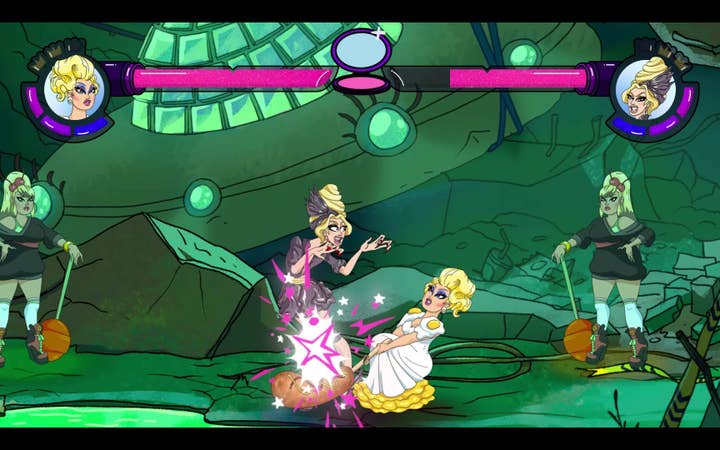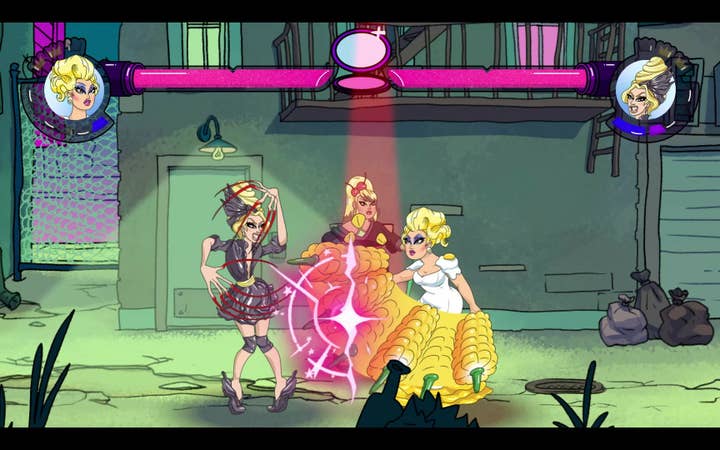Why successfully crowdfunded drag-themed fighting game Drag Her failed to launch
Fighting Chance Games director Ian Ramsay on how further funding failed to materialise despite positive reception
Drag Her, a 2D hand-drawn fighting game featuring a roster of real-life drag artists, launched its Kickstarter campaign back in February 2022 with a modest and cheeky funding target of $69,000. Yet despite meeting its goal, on May 15 2024, developer Fighting Chance Games announced the game's development had been officially shut down citing "a simple lack of funding."
Sceptics may wonder how a game that had met its Kickstarter funding goal would then run out of money, but for indies launching a Kickstarter, it's not uncommon to have a goal lower than the real costs of development as well as personal savings, in the hopes of securing a publishing deal to fund the game's full development. Whether or not this was clearly communicated to backers at the time is something that studio director and producer Ian Ramsay holds up as a personal failure.
"For us, the Kickstarter was specifically an opportunity to be like, 'hey, there's a market for this'," he tells us.
There had been about a year of development prior to the Kickstarter during which the team built a demo with just one drag fighter, but the crowdfunding money was essentially for funding a vertical slice "polished to the nines" that could then be presented to investors to secure more funding.
"It did open doors in that regard," says Ramsay. "We swung some grants from that. I think the failure to not be like, hey, this is strictly for a vertical slice, and instead promising something more that didn't eventuate is a fair criticism, and I feel really bad."
Yet on the surface, things looked like it was going well. Last summer, Drag Her was exhibited at the prestigious fighting game tournament Evo, where there was not only a small side tournament but also a 'Queen of Evo' pageant.
"I was nervous about Evo because it's a very masculine, competitive space," Ramsay explains. "Will people see this fluffy, femme fighting game as something that is of merit? And the response was overwhelmingly positive, which totally took us by surprise."
It may also have been because it got to stand out simply as an original IP in a genre that is historically dominated by a few series with a long legacy.
"Every person we met [to pitch to] was basically an old white dude. You knew the conversation wasn't going to go well if you had to explain what drag is"
Behind the scenes, however, Drag Her's development had actually already come to a halt, with Ramsay saying the studio had "just out of money and we [didn't] see anything on the horizon." The game's showing at Day of the Devs in November was the same build as Evo's with a roster of three, with the aim of having seven drag fighters in the final game. This is the same 'skinny' build that the team decided to release for free on Steam following the announcement of the game's cancellation.
"I think it was the correct choice to have this as our little token to the world that you can still have fun with at no cost," says Ramsay.
However, that also means none of the drag artists whose likenesses were included will receive royalties. The game was originally conceived with the intent of supporting drag performers during the pandemic when live events were shut down. But Ramsay reports: "All the queens we talked to were so loving and supportive and they were totally understanding."
While Drag Her fostered a loving and supportive community, the reality was the team still needed funding outside of that. Despite taking every call or meeting, including a potential Xbox Game Pass deal and a last-ditch pitch to Netflix that would have turned it into a mobile game, no deal materialised.
Ramsay says the only concrete and consistent feedback he received from publishers was that there was a general weariness about the genre of fighting games.
"If I can be bold, I don't really believe the fighting games angle," he says. "I believe people saw the cast, that we're leading with an all-femme, queer cast. Every person we met [to pitch to] was basically an old white dude. You knew the conversation wasn't going to go well if you had to explain what drag is."
The team did try to seek funding from progressive-leaning organisations and publishers that would "get it", although Ramsay mentions one such publisher had a much lower budget.
"I think there's a perception that femme games are a nascent industry and so they deliberately look at small, maybe solo projects," he says. "You don't see the other side of the equation, which is sort of like $500,000 to $1 million."
But even though drag has become more popular in recent years, it's also come under fire from far right groups, with protests against events like Drag Queen Story Hour becoming more widespread in the last couple years. As to whether this had a knock-on effect on Drag Her's development, while Ramsay says the team largely flew under the radar as a small indie project, the drag panic being whipped up did change the type of hate they received.
"They pulled up the sexual deviancy card so there were added insults on top of just calling us 'gay'," he says.

As to whether that was another factor that worked against the studio when pitching, Ramsay adds: "I think that definitely scared investors off. For people who didn't understand what drag was, for them to see haters and increased scrutiny of hate further makes the cast and project smaller. It makes it riskier, and in the current environment, one more reason to be averse to risk is another reason not to sign it."
The ultimate disappointment was that the game was receiving signals of support, all apart from the financial kind. "I would 100% take all the opportunities to showcase again, but I feel like we were put to the front a lot because it was good optics to have an all-queer team showing an all-queer game," says Ramsay. "But ultimately having a good showing doesn't necessarily change the funding situation."
"[Games] are far behind other mainstream media in terms of queer representation"
Drag Her's failure to find funding feels like an indictment of the current state of LGBT representation in games, even though the industry continues to celebrate games that feature LGBT characters and themes for Pride each year.
It would, however, be fair to say that few games are as overtly queer as a fighting game with a roster of drag artists that would also be represented diversely, including drag kings, trans drag queens and drag artists from different ethnicities. And Ramsay's only more pessimistic in a climate of industry-wide layoffs that has also meant less investment for indies.
"I feel like with each economic contraction in the industry, one of the first things to fall off are initiatives that put diverse voices forward," he says. "The stakes are higher for people who are diverse or queer. For queer-forward games, it's going to be more difficult. I think we're far behind other mainstream media in terms of queer representation. We'll get a cool swath of queer stories on Netflix or at the movies, but I think it's still very nascent in games, and we're not going to see publishers come to the table, not while the demographics of the game publishing world stay the same."
Nonetheless, he doesn't want this to deter other queer developers from trying to get their games made.
"I don't want our story to be the story, I want people to keep pushing forward because someone might find that right mix of genre and audience, someone might find a publisher that totally gets it, and that will move the industry forward. You have to try."

